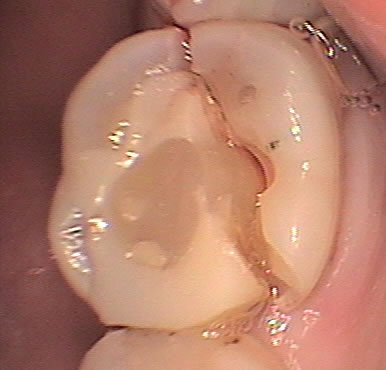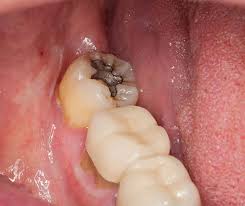The wisdom tooth, also known as the third molars, are the last set of molar teeth to develop in the mouth. Very often, these teeth can cause lasting problems as they do not have the space to grow properly and are hard to keep clean. As a result, they can become impacted and cause excruciating pain. In come cases, the wisdom teeth can become damaged and broken.
If you find yourself in the unfortunate position of dealing with a broken wisdom tooth, it’s essential that you take the right steps to manage the situation. In the rest of this article, we will explore the reasons behind a broken wisdom tooth, and guide you on the steps to take when you are suffering from one. So let’s dive in and empower you to make an informed decision about your oral health!
What Is a Broken Wisdom Tooth?
A broken wisdom tooth is a condition where the tooth becomes damaged or fractured. When a wisdom tooth breaks, it may mean that the tooth structure has been compromised in some way. The extent of the damage can range from a hairline fracture to a hole in the tooth.
A broken wisdom tooth can happen due to various reasons including tooth decay, cavities, physical injury or trauma, bruxism (grinding of teeth), or biting down on hard objects.
Most broken wisdom tooth are due to physical injury. Accidents, falls, or blows to the face can result in the tooth fracturing or breaking. Similarly, if you accidentally bite down on a hard object, such as a popcorn kernel or a bone, it can exert excessive force on the wisdom tooth and cause it to break.

The second highest cause of broken wisdom teeth are bruxism. The constant pressure and grinding motion can weaken the tooth structure over time, making it more prone to fractures.
Last but not least, while some individuals have no issues with the growth of their wisdom teeth, others may experience impaction, a condition where the wisdom teeth does not grow properly. Often, the wisdom tooth is either trapped beneath the gum line or against another teeth. This can make the wisdom tooth more prone to fractures.
The exact reason why a broken wisdom tooth can occur varies from individual to individual, and it needs to be investigated to prevent any future occurrences.
Is a Broken Wisdom Tooth an Emergency?
Whether a broken wisdom tooth is considered an emergency or not depends on the severity of the fracture and the symptoms you are experiencing. In some cases, a broken wisdom tooth can be classified as a dental emergency, while in others, it may be manageable with non-urgent dental care. In fact, some individuals may not realize they have a broken wisdom tooth until they undergo a routine dental check-up.
Here are some factors to determine if a broken tooth is an emergency:
- Is there an intense pain? Severe and unabating pain can be an indication of an emergency. Intense pain that makes it difficult to eat, speak, or carry out daily activities may warrant immediate attention. That said, even if you are suffering minimal pain, you should also consult a dentist for an opinion.
- Is there swelling, infection, or bleeding? If the broken wisdom tooth is accompanied by significant swelling, inflammation, or the presence of an abscess (a pocket of pus), it may require urgent attention. If left untreated, the broken wisdom teeth can become a breeding ground for bacteria, increasing the risk of infections.
- Is your oral function impaired? If the broken wisdom tooth affects your ability to open or close your mouth properly, interferes with chewing, or causes difficulty in speaking, it may be considered an emergency.
- Is it due to physical trauma? If the broken wisdom tooth is the result of significant trauma, such as a fall, accident, or blow to the face, it is advisable to seek immediate dental attention to rule out other potential injuries such as a concussion or damage to other neighbouring teeth.
It is always best to consult with a dental professional who can assess your specific situation and provide the appropriate advice. They will consider the severity of the fracture, your symptoms, and the overall condition of your oral health to determine if immediate attention is required
How to Treat a Broken Wisdom Tooth?
To address a broken wisdom tooth, it is essential to seek professional dental care. Your dentist or oral surgeon will typically conduct an X-ray examination to evaluate the extent of the damage and recommend the most appropriate treatment option.
In minor cases, the dentist may recommend a filling, much like a regular cavity. A dental filling is a restorative procedure where a filling material, such as composite resin or amalgam, is used to restore the tooth’s function and integrity. In the case of a minor broken wisdom tooth, the filling seals up any gaps caused by the breakage. This is a short-term solution to prevent food particles and bacteria from entering the broken area, which could cause an infection. Any rough edges caused by the broken wisdom tooth will also be smoothen out to prevent any cuts on the cheek.

In the event that the breakage extends into the pulp of the tooth, where the nerve and blood vessels are located, a root canal treatment may be necessary. This dental procedure involves removing the damaged or infected pulp, cleaning the root canals, and sealing them with a sealant A dental crown is then placed on top of the broken wisdom tooth to restore the tooth’s strength and functionality.
If the severity of the broken wisdom tooth is severe, an extraction will be necessary. Wisdom teeth are not essential for chewing, so their removal doesn’t significantly affect dental functionality. The extraction procedure is typically performed under local anesthesia, so it’s relatively painless.
After the extraction of your broken wisdom tooth, it is important to follow the instructions of your oral surgeon to ensure a speedy recovery. This includes not disturbing the extraction site, avoiding strenuous activities, and maintaining oral hygiene. Rinse your mouth gently with warm salt water to help reduce swelling and discomfort.
You may be interested in: Does It Actually Hurt To Get a Tooth Pulled?
Pain management is another vital aspect to consider when treating your broken wisdom tooth. Over-the-counter pain medications, ice packs, and salt water rinses can provide temporary relief while awaiting professional dental care. It’s essential to keep the area clean and avoid eating hard or chewy foods which could cause further damage or discomfort.
The appropriate treatment option should be determined by your dentist or oral surgeon, after evaluating the severity of the fracture and considering your specific circumstances. They will take into account factors such as the position of the tooth, the extent of the damage, your overall oral health, and any associated symptoms.
Closing Thoughts
Dealing with a broken wisdom tooth can be a painful and concerning experience, but knowing what steps to take can make all the difference in addressing the issue effectively. In this article, we have explored the topic of broken wisdom teeth and provided valuable information on what to do when faced with this dental predicament.
By being proactive and taking the necessary steps outlined in this article, you can effectively address a broken wisdom tooth and regain oral comfort and well-being.
Remember, the information provided here serves as a guide, but it is crucial to consult with a dental professional for an accurate diagnosis and personalized treatment recommendation.







